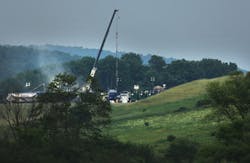The majority of European countries have made their position on fracking clear and, with the exception of Poland, which is making decisive steps in the direction of regulating fracking, and England, where the debate on the drilling technology is in full swing, most other countries have decided to steer clear of hydraulic fracturing.
But recent political events in Ukraine and Russia's involvement may cause some EU member-states to reconsider their stance, according to the International Business Times. Russia seems to be in a good position to keep its dominance on the European energy market and some European leaders are already considering exploration of alternative sources of energy. If Europe manages to increase its natural gas production its dependence on Russian gas will decline, International Business Times explained.
The new direction that the EU may take was reflected in a new legislation passed last week at the European Parliament, which further tightened environmental rules for oil and gas companies but exempted shale gas exploration.
Fracking has been advocated by a number of industry and trade organizations as a means to promote energy security and economic growth. Among them is European steel lobby Eurofer, which sent an open letter to European leaders calling on them to allow fracking. Gordon Moffatt, director general of Eurofer, said that the diversification of Europe's energy mix was of crucial importance to its competitiveness, the business newspaper reported.
